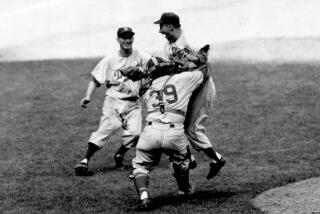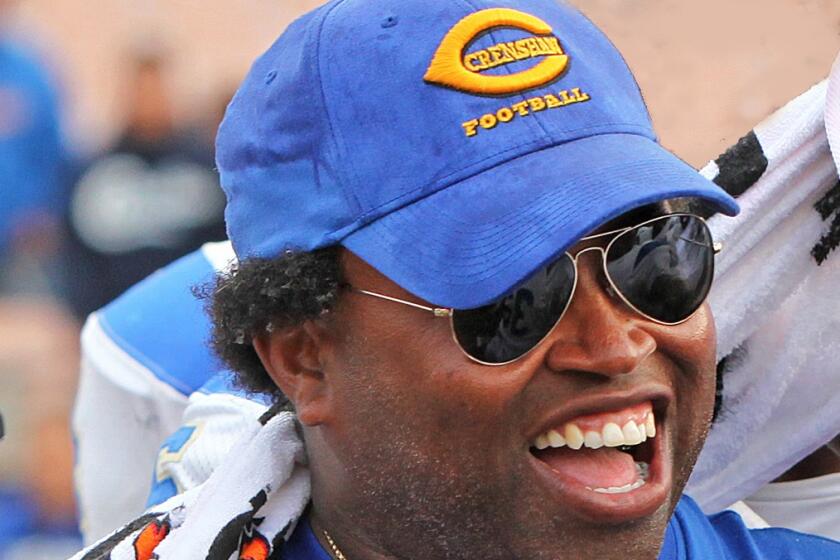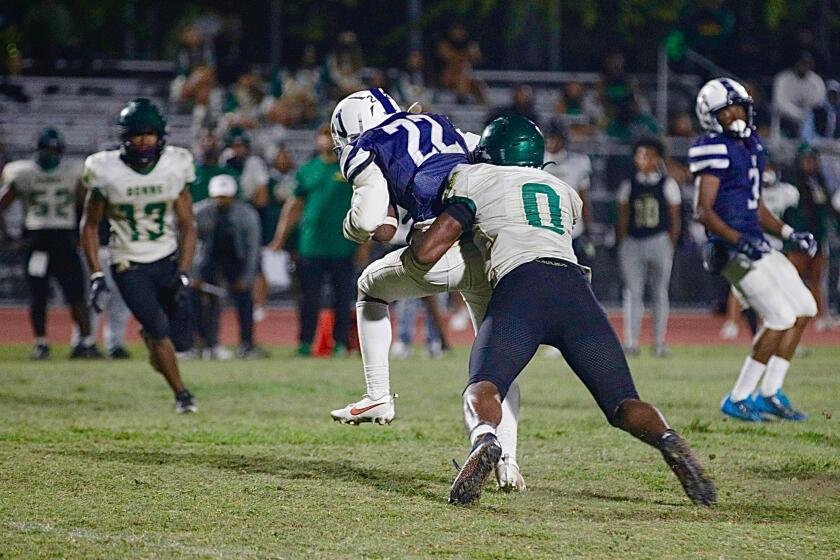Carter and Those Darlinâ Mets Tie the Series : Catcherâs 2 Homers, Pitcherâs 7 Shutout Innings Help Foil Nipper, Red Sox, 6-2
BOSTON â Borrowing a brown-edged page from the Boston Red Soxâs not-too-rich World Series heritage, Manager John McNamars bravely sent Al Nipper to the mound Wednesday night with the hope that his pitcher had some Gary Waslewski in him.
Waslewskiâs niche in Red Sox history was made in Game 6 of the 1967 World Series when Boston Manager Dick Williams, out of rested starting pitchers, thrust journeyman Waslewski into the fray. Waslewski stunned favored St. Louis by keeping the Red Sox close through the early innings--close enough for an eventual Boston victory that forced a seventh game.
Nineteen years later, McNamara took a similar risk with Nipper, a 10-12 pitcher with a 5.38 earned-run average who was last seen on the mound Oct. 4.
Nipper, too, kept it close--punching in with a creditable six innings, allowing the New York Mets seven hits and three runs.
But he couldnât get the Red Sox a win.
Three runs were enough--but not all--for Ron Darling and the Mets, who won Game 4 of the 1986 World Series, 6-2, before a Fenway Park crowd of 33,920.
Darling pitched seven more shutout innings, Gary Carter hit two home runs and Len Dykstra hit his second homer in two visits to Fenway--this one skipping in and out of the glove of Dwight Evans in an incredible simulation of Dave Hendersonâs memorable dunk in Game 5 of the American League playoffs.
It all went against the Red Sox, and it all added up to the fourth straight victory by the visiting team in this World Series.
After winning the first two games at Shea Stadium, the Red Sox returned to Boston talking about a sweep. Now, theyâre talking about a split and another ride on the Boston-New York shuttle. The Mets have rallied to even the best-of-seven series at two games apiece, have guaranteed at least one more game at Shea and have taken all that Red Sox thunder and reduced it to the sound of one hand clapping.
âItâs just another sign why baseball makes no sense,â Darling said. âWeâre supposed to feel comfortable at Shea--and we lose two straight. Then, (the Red Sox) come home--and they lose the next two.
âI didnât pitch all that well; Iâm just happy to get us back to 2-2. The main thing is, weâve broken out and hit the way weâre supposed to hit.â
Some will say McNamara allowed the Mets that chance. Had McNamara stayed with his three-man rotation, Game 4 would have featured a rematch between Darling and Bruce Hurst. Hurst won the first meeting, 1-0.
With a chance to bury the Mets in Boston--going for a 3-1 series lead with Hurst in Game 5 and going for the crusher with Roger Clemens in Game 6--McNamara instead, essentially, played for the tie. He held back Hurst and Clemens so they would both have four days off before their next starts.
By gambling with Nipper, McNamara sacrificed Wednesday nightâs game for uncertain results down the line.
âWe now have it the way we set it up,â McNamara said. âHurst pitched (Game 5) of the league championship series on three daysâ rest and was tired. Clemens went on three daysâ rest Sunday (a 9-3 Boston win) and did not have a Roger Clemens performance.
âNow, both will have their full complement of rest. (The Mets) are going to see our two best pitchers, fully rested. We wonât have any excuses.â
It was an intriguing test of stamina and endurance. The Mets were bringing back Darling on three daysâ rest. The Red Sox were bringing back Nipper on three weeksâ rest.
For good reason, McNamara had kept Nipper in the depths of the bullpen and out of trouble during the American League championship series. In his last 10 starts of the regular season, Nipperâs earned-run average was 6.97. One Red Sox writer described Nipper as âthe loudest pitcher in the league. When he pitches, all you hear is--CRACK! CRACK! CRACK!â
When McNamara handed Nipper the ball amid the World Series glare, most of Bostonâs citizenry cringed and plugged their fingers into their ears. They prayed . . . .and waited for the inevitable.
It came in the fourth inning.
Nipper had matched Darling with three scoreless innings, but the first hitter he faced in the fourth, Wally Backman, singled. One out later, Carter delivered his first home run, depositing the ball into the screen atop the left-center-field wall.
Then, Darryl Strawberry arose from his October hibernation just long enough to line a double to left, his first extra-base hit of the Series. Ray Knight followed with an RBI single, and Nipper was down, 3-0.
He left the game after the sixth inning in the same condition, although it took a double play by Jim Rice to keep it that way. With Carter on third base and one out, Knight hit a line drive to Rice in left. Rice ran in, caught the ball and then fired a mighty throw to home plate. Catcher Rich Gedman took the relay and had the tag waiting for Carter, wiping out the sacrifice fly and the Metsâ scoring opportunity.
âNipper did the job I expected,â McNamara said. âHe kept us in the ballgame.â
But the Red Sox could never close the gap on Darling, who left after seven innings with a 5-0 lead, then the Mets added their last run in the top of the eighth. One of these days, maybe Boston will score an earned run off Darling. Maybe in Game 7, when the Red Sox get their next chance. They beat Darling on an error in Game 1 and managed four hits against him in Game 4.
In 14 World Series innings, Darling has an earned-run average of 0.00.
âThe story tonight was Ron Darling,â said Met Manager Davey Johnson, whose love-hate relationship with the pitcher had produced countless stories during the regular season. âHe pitched a great ball game on three daysâ rest. He has a very resilient arm; he could really pitch in a four-man rotation.
âI felt he would be a big guy in the Series and if I needed somebody to pitch three times, he was the guy.â
If thereâs a seventh game, Johnson said Darling will be his starting pitcher.
Darling skirted major trouble in five of his seven innings as Boston left nine runners on base. Wade Boggs, the American Leagueâs leading hitter in 1986, personally stranded five. For the game, Bill Buckner, who drove in more than 100 runs this season, stranded nine--which breaks down neatly to one per inning.
The Red Sox helped the Mets at every turn. In the seventh inning, with New Yorkâs lead still 3-0, Dykstra lofted a deep drive to right field. Evans, a multiple Gold Glove recipient whose dive robbed Dykstra of extra bases in Game 2, drifted back for the ball. He reached up, got his glove on the ball and then ran into the fence.
The impact caused the ball to trickle out of Evansâ grasp and over the wall. Two-run homer, 5-0 Met advantage.
Such has been the theme of the Red Soxâs stay at Fenway. They had momentum, the 2-0 lead, the chance to clinch the title at home. They had all that in their hands.
Then they hit the wall . . . and it all slipped away.
More to Read
Go beyond the scoreboard
Get the latest on L.A.'s teams in the daily Sports Report newsletter.
You may occasionally receive promotional content from the Los Angeles Times.










